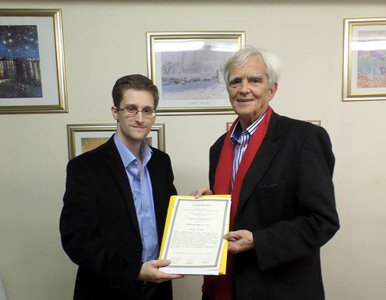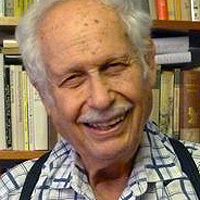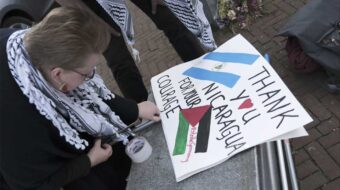
BERLIN – It was a good try, anyway — and an adventurous one. Three men flew from Berlin to Moscow, were taken in a car with tinted glass windows to a secret location – where they met Edward Snowden and his partner-in- (alleged)-crime, Sarah Harrison.
The meeting was very interesting. So were the three visitors.
The Green man
Trio leader was Hans-Christian Stroebele, 74, Bundestag representative from a mixed East-West Berlin electoral district, the only Green Party delegate directly elected (four times); the other 62 got in thanks to Germany’s proportional representation system. Anyone joining in anti-war rallies recognizes the rather haggard-looking man who – until recently – always arrived pedaling a bike. He was always (or almost always) the Green deputy opposing wars in Iraq, Kosovo, Afghanistan, Patriot missiles for Israel, who fought hardest against anti-foreigner discrimination (even supporting the right of immigrant-rooted police officers to wear turbans or head cloths and a Turkish version of Germany’s national anthem. A constant thorn in the side of war-happy Green Foreign Minister Joschka Fischer (1998-2005), he has (almost) always been a maverick, well to the left of other Green leaders. And as a maverick he flew to Moscow.
Two investigative journalists
But Stroebele’s English is not too good. So, sharing the fruit, fish and other Russian delicacies – and the scoop – was Georg Mascolo, 50, Italian-German journalist, a former correspondent in the USA and editor of Der Spiegel (before getting fired after two years), and also the American journalist John Goetz, 52, born in New York, a TV-journalist in Berlin since 1989 and also writing for a leading Munich newspaper.
Goetz’s big scoop in 1993 revealed that the German government was still paying pensions to Latvia’s Nazi SS veterans, who held militant marches in Riga every year while veterans of the Red Army and the few Jewish survivors in Latvia were cruelly ignored or short-changed. As a result, the pensions were finally halted (unfortunately not the parades).
He later exposed the financial shenanigans of a slippery arms dealer profiting from deals between manufacturers in Canada and rightwing Bavarian politicians, did a series on Germany’s secret assistance to the US war in Iraq (despite official abstention) and helped expose “extraordinary renditions” by US planes across Germany to secret torture locations. His first impression of Snowden: “A slight fellow, short, quite thin, black suit, blue shirt, with angular glasses too large for his face.” But then came the questions and frank, honest, impressive answers. And an offer of assistance.
Why Snowden won’t be visiting
Stroebele passed on Snowden’s letter to the German government, expressing willingness to testify as an expert witness on NSA spying directed against Germany – and Chancellor Angela Merkel. The one stipulation about coming to Germany was that he be guaranteed freedom from extradition to the USA and, since Russia might then rescind his current status, a right of asylum.
But the chances of such a visit soon dropped to near zero. When it was revealed that Merkel’s mobile phone was tapped by NSA — like those of millions of other Germans – she had spoken out far more angrily than is customary for the usually mild-toned German “Mutti” (Mama). But, very predictably, while still mumbling that “Such practices must be altered” she had her office explain that, after all, “the transatlantic alliance is of overwhelming importance to us Germans” and it was soon announced that a delegation of US Congress members would fly over to voice their regrets and try to repair damaged fences. In such a romantic, Atlantic relationship Snowden would only be in the way.
The fight for public power
As that greatest of Scottish poets Bobbie Burns wrote: “The best-laid schemes o’ mice an’ men gang aft agley, An’ lea’e us nought but grief an’ pain.” The past two years witnessed a scheme or plan, this time not by three but by thousands of Berlin citizens. In late October 2010 a group decided on an initiative to communalize the city’s power supply, which meant buying it back from the giant Swedish enterprise Vattenfall. Their slogan: “Democratic (city-owned), ecological and social (lower prices)”. The group, which eventually included fifty organizations, received the backing of all three opposition parties in the Berlin House of Representatives, the LINKE (Left) party, the Greens and the Pirates and, after some negotiation, also the Social Democrats, the leading party in the ruling Senate (the name of the city government). Only the Christian Democrats, also in the governing coalition, rejected the idea. It looked as if the law repossessing the power supply of the city could easily pass a vote.
But then the Social Democrats, bowing to their right wing coalition partners, turned tail and reneged on the plan. This meant that far more signatures were required in a new campaign to obtain a referendum of all Berliners. A powerful campaign was initiated, obtaining between February and June 2013 over 271,000 signatures; 228,000 were ruled valid, a huge triumph, which meant that a referendum of Berlin voters must now take place.
It was planned for September 22nd, the day when the whole country elected a new Bundestag – and about 70 percent go to the polls. But the ruling duo, Social Democrats and Christian Democrats, put a spiteful spoke in this wheel. They moved the date for the referendum to November 3rd – when far fewer voters could be attracted to polling booths for a single Yes or No vote so soon after the earlier elections. But the two parties had the majority of representatives – and ruled the roost.
All the same, enthusiasm was maintained, if far more worried. The city was filed with posters and a ray of hope came from distant Hamburg where a similar referendum scraped though with 51 percent. But that was on the all-German Election Day, when so many voted.
The big problem was not getting a majority to approve the new law; that was quite certain. But the vote would only be successful if 25 percent of all Berlin voters approved – and how many would go to the polls?
The result was bitter. Less than 30 percent voted. A very big majority voted Yes, but even after the last mail-in votes had been counted they tallied up to only 24.1 percent, just 0.9 percent short of the mark. Or, in absolute terms, 620,000 Yes votes were required, but the final count was 599,565! One thought again of Burns’ sad mouse and sad plowman!
Meanwhile, also in Berlin, but now occupied with all-German themes, those two obstructive parties, the Social Democrats and Christian Democrats – plus the Bavarian sister party of the latter, the Christian Social Union (CSU) – continued negotiations on their “grand coalition”, which hopes to agree on all points, compromises and cabinet assignments before Christmas. Not all too many holiday gift presents can be expected, either for Germany’s southern neighbors in the European Union or for many working people in Germany, or those who work only part-time or not at all through no fault of their own. The current dispute, however, centers on whether autos on the famous Autobahn highways, favored by no speed limits on many stretches, should also have to pay tolls – hitherto required only from truckers. The Bavarian party wants to charge only foreign drivers, Merkel and the Social Democrats have been against all tolls, but Angela seems to be weakening on this point. We do not yet know how many how points the Social Democrats have been weakening on.
In big, important Hesse, where Frankfurt (Main) is located, there was also a tight vote in September, and it is still uncertain whether a similar “grand coalition” will be arranged here, as on the national level and in the city-state Berlin. Still a slight possibility is a Social Democrat-Green plus Left coalition which would defy deep-seated prejudices against the LINKE and set a new precedent. Another stumbling block: The LINKE wants to close down the extremely noisy fourth runway at Frankfurt’s giant airport; the noise has been catastrophic and almost life-threatening to thousands of citizens down below the aerial rush hour traffic. The Greens want to restrict night traffic (as a high court has ruled). The Social Democrats want no bars; like Lufthansa they say, “The flights are needed”. There are other disagreements in a highly delicate situation. If a three-way coalition includes the LINKE, some will paraphrase words from that old American Revolution, either as a warning, or as a joyful chant: “The Hessians are coming!”
One thing seems quite certain. If not the Hessians then at least Mercedes is still coming along, at least in government circles. In an earlier commentary, I noted that BMW had given the Christian Democrats a large financial present – at just about the same time the restrictions on CO-2 emission were postponed by the European Union, under Merkel’s pressure. It has now been revealed that a major official in Merkel’s office, Eckart von Klaeden, stayed at his comfy government job until the elections and has now quit for a far comfier job as head lobbyist for that other heavy carmaker giant, Daimler-Benz. His switch was already known in May but von Klaeden kept his patriotic and noble nose to the government grindstone until September. He had “no influence on policy” it was hastily stated by government spokesmen – but had every opportunity to learn Merkel’s plans to put off carbon CO-2 limits – and perhaps just possibly to help frame them? Now he will do that openly (and, as we now know, few secrets are really secret anyway). Yet, despite all the dirt, the Social Democrats also “want in”. And close to half of all voters supported “Mutti” Merkel.
I introduced a tiny zoological note in quoting Burns about a mouse. I will end with a zoological note connected with my bird-watching hobby. Every November I rejoice when thousands of black northern rooks visit the city, engaging in marvelous maneuvers in the evening (and probably early morning) sky. Joining them is a smaller number of black-and-gray jackdaws – for whom arrival here also represents “going south for the winter”. They strut fearlessly on lawns and sidewalks, arrogantly staring us humans down as if to say, “What are you doing here on my territory?” Both are members of the crow family, said to be the cleverest of birds. I enjoy their visit, and say to myself, “Better rooks and jackdaws than crooks and jackasses!”
Photo: In Moscow, Hans-Christian Stroebele handed Edward Snowden the Honorary Diploma of the Whistleblower Award 2013, which had been awarded to him in absentia. Irina Oho. Hans Christian Ströbele’s Facebook page.












Comments